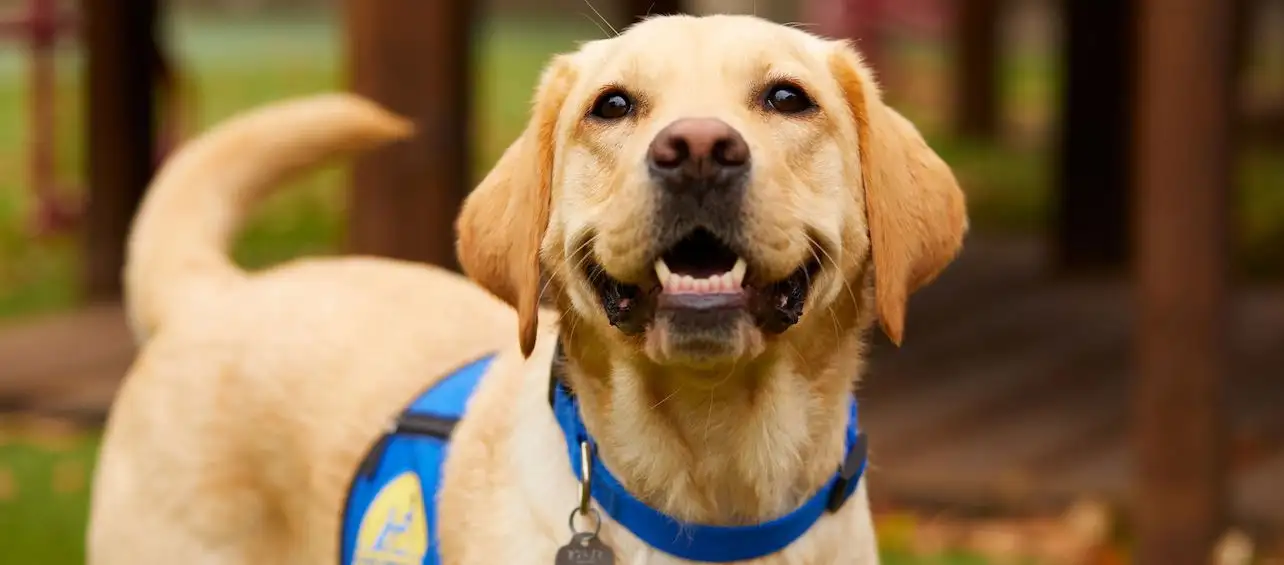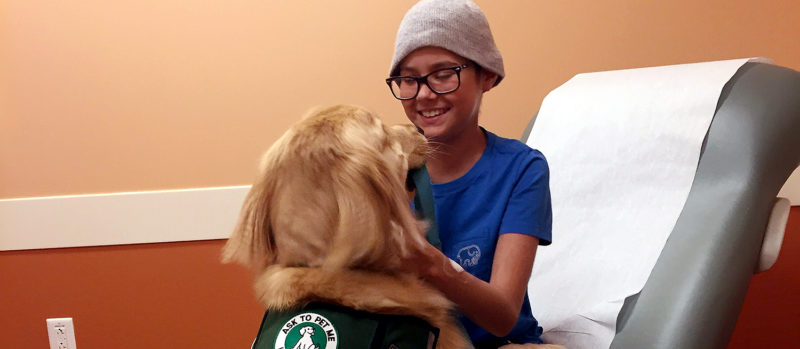I’d like to introduce you to Trinity, one of three facility dogs working here at Cincinnati Children’s. My name is Emily and I’m a social worker as well as Trinity’s handler. That means Trinity works with me at the hospital, and she goes home with me at the end of each day.
We work together in the Mayerson Center for Safe and Healthy Children, which is the child advocacy center at Cincinnati Children’s. Our team works together to evaluate, diagnose, and treat children who have been the victims of child maltreatment. Since Trinity first started working with me in 2020, she has helped bring comfort to a lot of families who are going through some really difficult times.
My job involves conducting forensic interviews, and Trinity is an extension of me and the work that I do. She supports patients and their families when they come to our center.
I get asked a lot of questions about Trinity and the work she does. Below is what a typical day is like for her in the hospital.
7 a.m. Time to wake up!
Every day Trinity wakes up and gets her “Trinny Dinny.” That’s what we call her meal times.
7:30 a.m. Get dressed and ready to go
Trinity gets dressed for work just like grown-ups do. She wears a special vest to let people know she’s a working dog. She knows putting her vest on means getting the workday started. She loves going to work. She rides in the back of my car to and from the hospital.
8 a.m. Arrive at work
While I’m getting my coffee, I put Trinity on “release.” That means she’s off duty and can choose what she would like to do. Trinity walks around our center and greets our forensic nurses, administrative assistants, social workers, physicians, and therapists. Trinity loves to make her morning rounds, and our staff loves to start their day with a “good morning” from Trinity.
9 a.m. Huddle call
Each morning our team has a huddle call to plan for the patients we will work with that day. Trinity usually takes it easy at this time, resting or visiting with staff.
10 a.m. Patient interview
Each day, Trinity sees anywhere from 1-3 patients with me. I first meet the patient and their family to make sure Trinity’s intervention would be appropriate. Trinity then gets to meet the patient and their family while we talk about what’s going on. Trinity will support the patient throughout their forensic interview and during their medical exam if one is needed.
The patients we see come to talk about difficult experiences—sexual abuse, physical abuse, and witnessing violent crimes. Patients and families are often anxious and fearful about their appointment with us. Trinity’s gentle temperament and loving personality send a strong message that there is nothing menacing in our environment. Families are pleasantly surprised when they are offered Trinity’s intervention, and their focus shifts to Trinity instead of on the apprehension they felt about the appointment. Trinity’s ability to exude safety eases separation anxiety and motivates the most hesitant patients to walk with me and Trinity to the interview room and share their stories.
After our introductions, I ask the child I’m interviewing if they want to hold Trinity’s leash and walk her back to the interview room. She acts as a motivator to help kids separate from their parents so they can talk to me. Holding the leash gives kids a sense of control, which is important because when they’re here, many times much in their lives is out of their control.
Trinity sits with the child during the interview or lies with them on the couch. I can position her in ways that maximize comfort for kids. Some kids like to lie and cuddle. Others find it soothing to pet her, rub her ears, or play with her hair or the leash. Sometimes Trinity notices when a child needs affection and she moves to a more comforting position before I’ve even asked her to. All of these efforts lead to helping kids feel better about opening up to me. A very reluctant child once said to me, “I’ve been trying not to tell you about this, but since Trinity’s here, I’ll go ahead and tell you.”
By the end of the appointment, often the family has become fast friends with Trinity and many times they end up taking a picture with her. Instead of leaving the center focused on the interview and exam, the family leaves talking about Trinity.
12 p.m. Lunch break and potty break
Trinity gets breaks in her workday, just like humans do!
1 p.m. Patient interview
Trinity works hard to comfort patients and families the same way she did in the morning interview.
2:30 p.m. Outside time with friends Leica and Chevy
Trinity and I get outside to play at least once a day. We have two other facility dogs working at Cincinnati Children’s, Leica (whose handler is Kerri) and Chevy (whose handler is Katie). Leica and Chevy support patients on our inpatient and outpatient units. Kerri, Katie and I have a facility dog group chat that we use to arrange times for the dogs to meet outside when possible.
The hospital has a playground on our campus and that’s where we meet so the dogs can play together. Sometimes we take a break on our own, but Trinity’s favorite breaks are when she gets to play with Leica and Chevy.
A lot of people ask me, “How do I get my dog to do this?” But all three of these dogs did not start their lives as pets. They were purposely bred to be facility dogs and they come from service dog organizations. They go through rigorous training so that they are socialized, great with kids, and have been exposed to behaviors, noises and sounds that help them function well in a hospital.
3 p.m. Rest time
Trinity has her own area within the Mayerson Center with a bed and toys. If I’m busy with a meeting or when we’re in between patients, she rests there. She loves napping and often falls asleep with a stuffed toy in her mouth.
4 p.m. Staff visit
Our staff in the Mayerson Center deal with some tough topics that can be hard to listen to day after day. Because of this, sometimes the staff experiences what is called “secondary trauma.” So Trinity also provides support to them. The simple act of petting a dog can be therapeutic, and receiving Trinity’s affection can help lift our spirits if we’ve had a rough day. The staff love having her around and they spoil her whenever they can.
5 p.m. Time to head home
When our day is finished, Trinity hops into the back of my car again and we drive home. I take her vest off and then she’s pretty much a normal dog once we’re home. She gets her Trinny Dinny again at dinnertime, and then we might go for a walk or to a dog park in the evening and on weekends.
—–
Trinity’s support during interviews and medical exams helps calm, soothe and provide comfort to kids so they are better able to tell their story. And that, in turn, helps to make sure that crimes are prosecuted to the fullest. We hope eventually to be able to have Trinity accompany families when they need to testify at court hearings.
Trinity’s presence takes what can be a scary visit and turns it into something more positive. Having her here helps bring light into the life of a family who is in the midst of some pretty dark times. There is a big effort in healthcare to improve the patient and family experience and be more trauma informed. Trinity is the embodiment of that.






